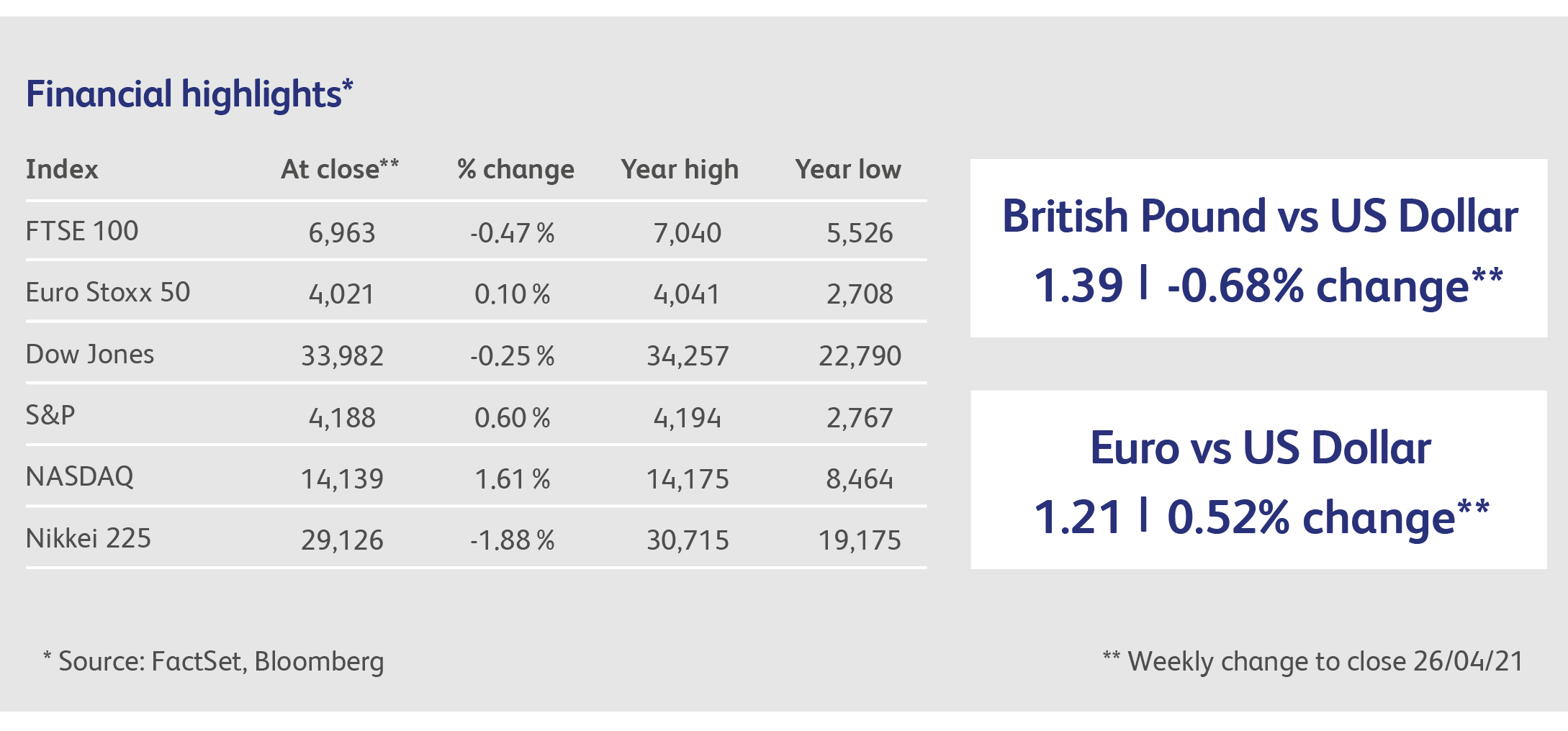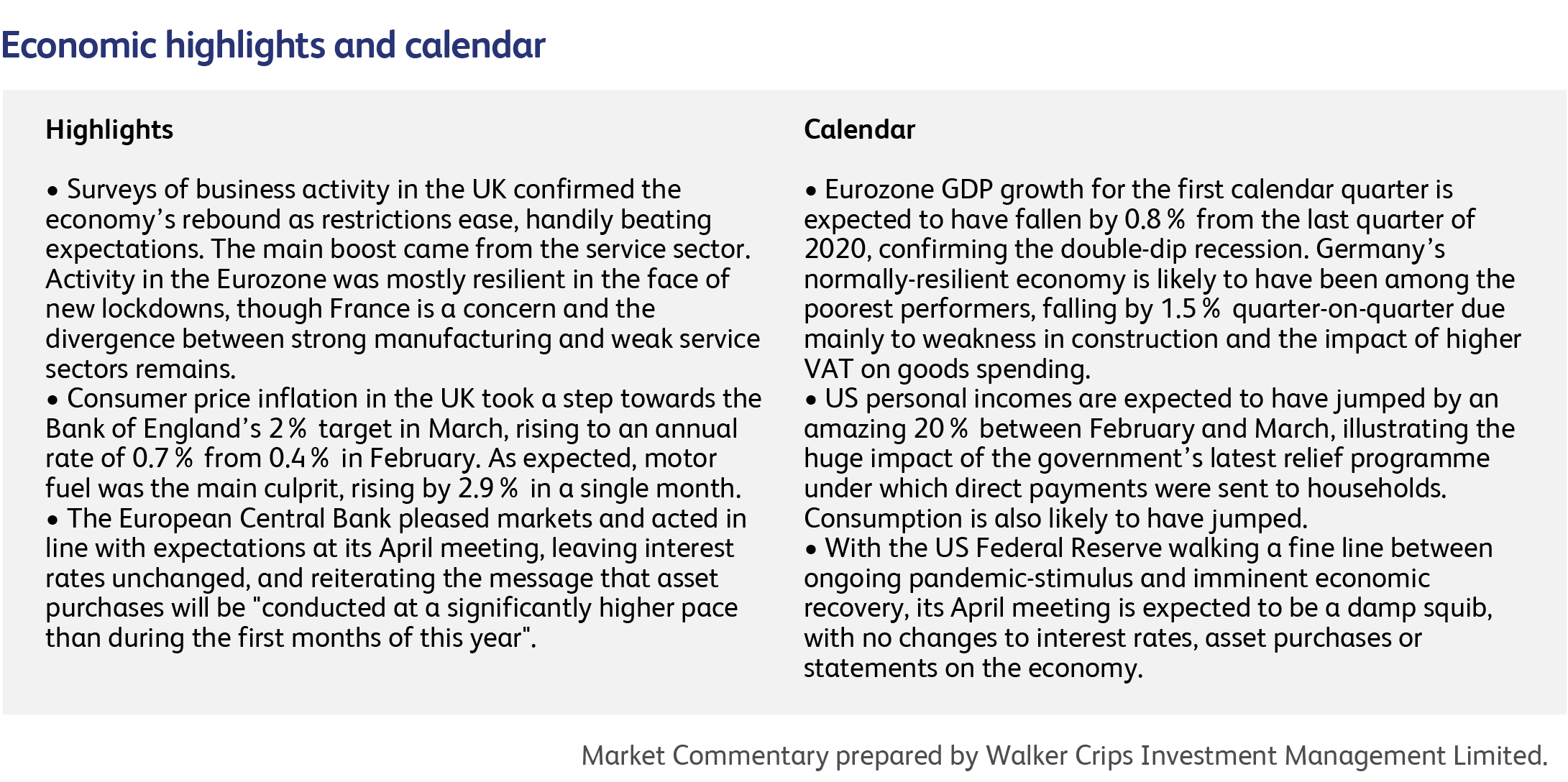
27 April 2021
China was the first country to encounter Covid-19, the first to exit from the pandemic and the first to see the economy return to its pre-pandemic size. It has also been the first country to see the stockmarket fall significantly from its 2021 highs, with most major Chinese stockmarket indices currently down about 7-10% from their peaks. Under cover of the pandemic, Chinese capitalism has been experiencing some growing pains. First was the authorities’ cancellation of the flotation for Ant Financial, one of the largest initial public offerings ever planned, apparently following public criticisms by its founder, Jack Ma, of China’s regulatory approach to the finance sector. Jack Ma disappeared from view for several months afterwards, but was back in the spotlight recently when another of his creations, internet giant Alibaba Group Holdings, was fined a record $2.8 billion by Chinese regulators for anti-competitive practices.
The focus has now switched to the bond markets where one of China’s largest issuers, China Huarong Asset Management, is threatening to default on $42 billion of debt. Defaults are rare enough in China, but what makes this one potentially spectacular is that the company is a “state-owned enterprise”, with its debt effectively backed by the Chinese Ministry of Finance. Moreover, Huarong is viewed as a systemically important financial institution and is one of the biggest issuers of offshore debt: about $23 billion of Huarong’s debt is denominated in US dollars and held by foreigners. The patience of foreign investors is certainly being tested: the company ceased filing financial information with the Hong Kong Stock Exchange and has taken to internet chat groups and other, less formal, online forums to disseminate information. Perhaps the writing was on the wall when, several months ago, Huarong’s chairman was executed.
These events are a consequence of China’s aggressive economic growth policies of the past decade, which often involved huge investments in infrastructure, backed by the authorities, and funded by debt. Over the past few years, the Chinese government has been extricating itself from the worst-managed state-owned enterprises, allowing them to default. In fact, for the first time last year, more than half of onshore bond defaults involved state owned enterprises. The message to Chinese entrepreneurs and investors, who have largely had a free ride on the government’s appetite for growth and huge debt capacity, is “welcome to risk”.
The British government’s borrowing requirements for the current financial year were estimated by the Office for Budget Responsibility (OBR) last week, proving that the Chinese government is not the only one indulging in debt funded economic support; post-pandemic, this has become the norm all across the globe. The forecast, for £234 billion of borrowing, equates to about 10% of GDP and follows a year in which government borrowing was about 14.5% of GDP (the highest since the second world war). The UK experience suggests that, despite the imminent re-opening of the economy and the anticipated rebound in economic activity, government support and spending will continue at pandemic levels for some time to come. The economic effects of the pandemic are expected to linger.

Netflix shares swooned after the company reported its worst quarter for new subscribers since 2013. Only 4 million new customers were added in the first calendar quarter, below the company’s own forecast of 6 million, and compared with the 16 million added in the first quarter of 2020. Even worse, the company forecast that only 1 million new subscribers will be added in the current quarter, a fraction of the 4 million projected by analysts.
Questions were raised about Intel’s business model following the company’s latest results, which saw a steep decline in gross profit margins, and revenues in its profitable data centre business falling 20% from a year earlier. The company’ chips, once dominant in the industry, have been challenged by competitors catching up and customers designing their own components. Until the 6% decline in the share price following the news, Intel shares had been close to their all-time highs.
Tesla Inc., has reported record quarterly profits of $438 million, up from $16 million last year, despite supply disruptions due to a global shortage of computer chips. Revenues for the quarter rose to $10.4 billion, up from $6 billion last year, and were bolstered by sales of Bitcoin, which contributed $101 million in revenues, and environmental credits, which contributed $518 million to revenues. Tesla reported it delivered 184,877 vehicles in the first quarter, more than double for the same period last year.
Ride-hailing company Lyft Inc., has agreed to sell its self-driving division to a unit of Toyota Motor Corp. for $550 million. A Toyota subsidiary, Woven Planet Holdings, will pay $200 million up front as part of the deal, and the remaining $350 million will be paid in cash over a five-year period. Lyft have claimed the deal will help them turn a profit sooner than previously expected.

This publication is intended to be Walker Crips Investment Management’s own commentary on markets. It is not investment research and should not be construed as an offer or solicitation to buy, sell or trade in any of the investments, sectors or asset classes mentioned. The value of any investment and the income arising from it is not guaranteed and can fall as well as rise, so that you may not get back the amount you originally invested. Past performance is not a reliable indicator of future results. Movements in exchange rates can have an adverse effect on the value, price or income of any non-sterling denominated investment. Nothing in this document constitutes advice to undertake a transaction, and if you require professional advice you should contact your financial adviser or your usual contact at Walker Crips. Walker Crips Investment Management Limited is authorised and regulated by the Financial Conduct Authority and is a member of the London Stock Exchange. Registered office: Old Change House, 128 Queen Victoria Street, London, EC4V 4BJ. Registered in England number 4774117.
Important Note
No news or research content is a recommendation to deal. It is important to remember that the value of investments and the income from them can go down as well as up, so you could get back less than you invest. If you have any doubts about the suitability of any investment for your circumstances, you should contact your financial advisor.